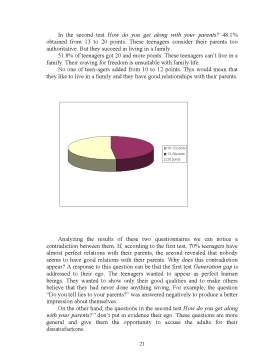Cuprins
- Introduction
- 1. Previous studies on the topic 1-2
- 2. Lack of communication between adults & adolescents 3
- 2.1. Problems 3-6
- 2.2. Solutions 7-9
- 3. Sincerity shortage in parent – teenager communication 10
- 3.1. Causes 10-14
- 3.2. Steps to frankness 15-17
- 4. Generation Gap among my peers 18-22
- Conclusion
- Annex
- Bibliography
Extras din proiect
1. Previous studies on the topic
There is no question that the world in which our parents were raised is vastly different from our own. The recognition of this fact, as Keniston (1971) and others have noted, tends to magnify the differences among generations rather than emphasize the similarities among parents and teenage. While generational differences may influence psychological functioning, such as type or amount of information, it may be erroneous to continue to emphasize a “generation gap” in terms of attitudes and values.
Tolor (1976), for instance, compared the values of 2.909 high-school students, college students and parents. He assessed their support of traditional attitudes towards family life, work, and higher education. There was little support for a large generation gap in the data, although high-school and college groups were less traditional in their attitudes than the parent group. The group that differed most from parent group was the college-age sample, not the younger adolescents. High-school students were closer to the attitudes of parent group than were college students. Although the study was not longitudinal, Tolor suggests that adolescents continue to be influenced by parents through high-school and to show similar attitudes and values. It is in college that the sharpest divergence in attitudes from parents occurs. Then, there is a shift back to more traditional values and attitudes once the college years are over, as individuals assume work roles and a more structured place in society. Although there may be differences in attitudes between adolescent and parent, these differences are not as great as many have suggested. The generation gap may appear large because of the freedom which adolescents have to express their growing individuality.
To extent to which adolescents experience conflicts and difficulties in development is a matter of sharply divergent opinion among psychologists. Some psychologists see adolescents as engaged in a battle to survive this period of “storm and stress”, while others think adolescents move through this phase of life few problems and stress. Bandura (1964) has presented a number of reasons for the popularity of storm and stress notions of adolescence. Based on his interviews with adolescent boys, he concludes that most adolescents easily pass through this phase of life with a minimum, not a maximum of problems. Adolescents accept their parents' values with no hint of rebellion, and emotional upheaval.
Descriptions of adolescence as a period of great stress may be seen in terms of the self-fulfilling prophecy. That is, expecting all adolescents to experience stress, rebelliousness, and emotional turmoil may help to maintain and encourage these behaviors. Adolescence, like and other period in human development, involves both conflicts and adjustment. It is unfortunate that our society has overemphasized the problems which characterize these years. As you will see, there are many adolescents whose experiences are marked by mastery success, and a sense of satisfaction. For them adolescence is a developmental period handled efficiently and effectively and marked by a relatively small number of problems. Through the self-fulfilling prophecy, however, both adolescents and adults may be sensitized to problems which become magnified in importance at this time. By expecting to find problems, both adolescents and adults may help to create them.
2. Lack of communication between adults & adolescents
2.1. Problems
How many times have parents tried to give their teenage son or daughter a small piece of advice only to be interrupted in midsentence by an exasperated “I kno-o-o-o-w!”. The fact is parents know that their child probably does not know. Still, there is no convincing him or her of that. Their use of the words, “I know”, means: forget it; I'm not listening; don't talk about it anymore; you do not know anything; leave me alone.
It would be bad enough if it just ended with that, but as often as not this attitude teen-agers have of not wanting parental interference carries over into a more generalized basic behavior pattern of cutting off all but the most essential and rudimentary communication with their parents. That sweet little girl or that cute little guy who used to give a cheery, “Hi, Mom!” each time he or she popped into a room parents were in, no matter how many times within the course of any five-minute period, now suddenly has turned into a sullen lout who treats parents as an intruder, and communicates largely by means of grunts and scowls, if not outright groans.
Preview document
Conținut arhivă zip
- Bibliografie eng.doc
- Conclusion.doc
- Contents.doc
- eng 1.doc
- intoduction.doc


































